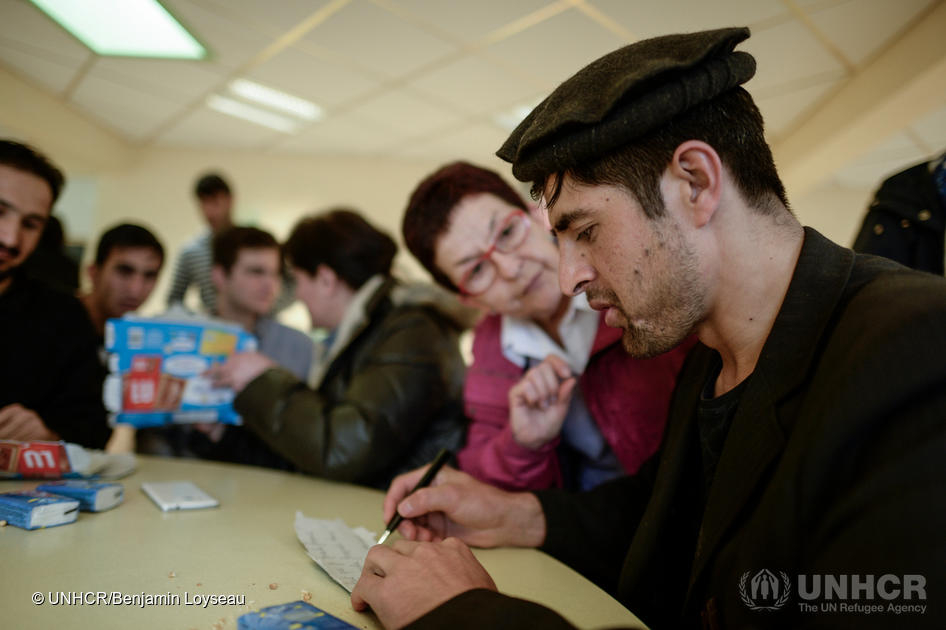
Practical information
In 2017, IFRI created a working group composed of a dozen prominent figures from different backgrounds: voluntary sector of asylum and immigration, research, trade union, media, social work, emergency housing, human rights sector, Muslim chaplaincy in prison, feminist associations, city networks… On the occasion of the project closure, the objective of this panel discussion is to put forward some of the most important conclusions and to promote a broader dialog among the sector’s different actors in order to open up the discussion on these subjects. Among the guests invited to this exchange are political and economic decision-makers as well as representatives from the voluntary sector, foundations and the academic world.

Program
9:15 am - 9:30 am Introduction
Christophe BERTOSSI, Director of the Centre for Migration and Citizenship, IFRI
9:30 am - 11 am What Role Does Work Play in Migration and Asylum Policies?
Work represents a cross-sectional dimension of migration and asylum policies. It represents not only a tool of regularization but also a driving force for social integration and mobility. However, it seems that the issue of work has become a secondary consideration in the French debates on immigration, with a main focus on the distinction between refugees and economic immigrants. This panel discussion seeks to initiate an exchange of views on the role of work in receiving immigrants and refugees, and to highlight the interactions between immigration policy and the labor market situation.
The discussion will be introduced by Francine BLANCHE, Head of the Migration Unit, General Confederation of Labor (Confédération générale du travail, CGT).
11:30 am - 1 pm How to Talk about Immigration and Diversity in France Nowadays?
The issue of immigration, asylum and Islam is one of the most sensitive topics in France and Europe. The compounding effects of the economic crisis and the rise of identity politics have reinforced existing biases on these topics. At the same time, this sensitivity exerts a strong influence on the decision-making process. Our panel discussion aims to start a conversation to explore possible ways to look beyond preconceptions and better place the debate in the complex realities of immigration, asylum and Islam.
The discussion will be introduced by Clotilde GINER, Deputy Director of the Migration Unit, Order of Malta (France).
The discussion panel forms part of a project conducted by the Centre for Migration and Citizenship of IFRI with the support from the Open Society Initiative for Europe Program of the Open Society Foundation.
The working group includes Matthieu Angotti (General Director of the Community Centre for Social Action (CCAS) of the city of Grenoble), Francine Blanche (Head of the Migration Unit of CGT), Laura Brav (Head of the emergency housing center La Péniche du cœur), Nadine Camp (expert), Samia El Alaoui Talibi (Muslim chaplain of the prison administration of Lille), Jean-Baptiste François (journalist from La Croix), Clotilde Giner (Deputy Director of the Migration Unit, Order of Malta in France), Irena Guidikova (Head of Division, Inclusion and Anti-discrimination Programs of the Council of Europe), Christophe Harrison (Head of the General Administrative Secretariat, France terre d’asile), Danièle Joly (Research Associate, Centre of Migration and Citizenship of IFRI and School of Global Studies of FMSH), Nada Nader (Head of Development and International Cooperation, Euro-Mediterranean Feminist Initiative, Paris), Mohammed Ouaddane (General Delegate of the Réseau Mémoires-Histoires of the Ile-de-France region and General Coordinator of the Inter-réseau Mémoires-Histoires).
Members of this group have participated in this project on a strictly individual basis and do not in any way represent their institutions.
Related Subjects
Other events

Paris Naval Conference 2026: Naval Rearmament and Operations in Contested Waters
This fourth edition of the Paris Naval Conference (CNP), bringing together high-level military, industrial, and academic speakers, will address the challenges associated with general naval rearmament and naval operations in increasingly contested environments.





